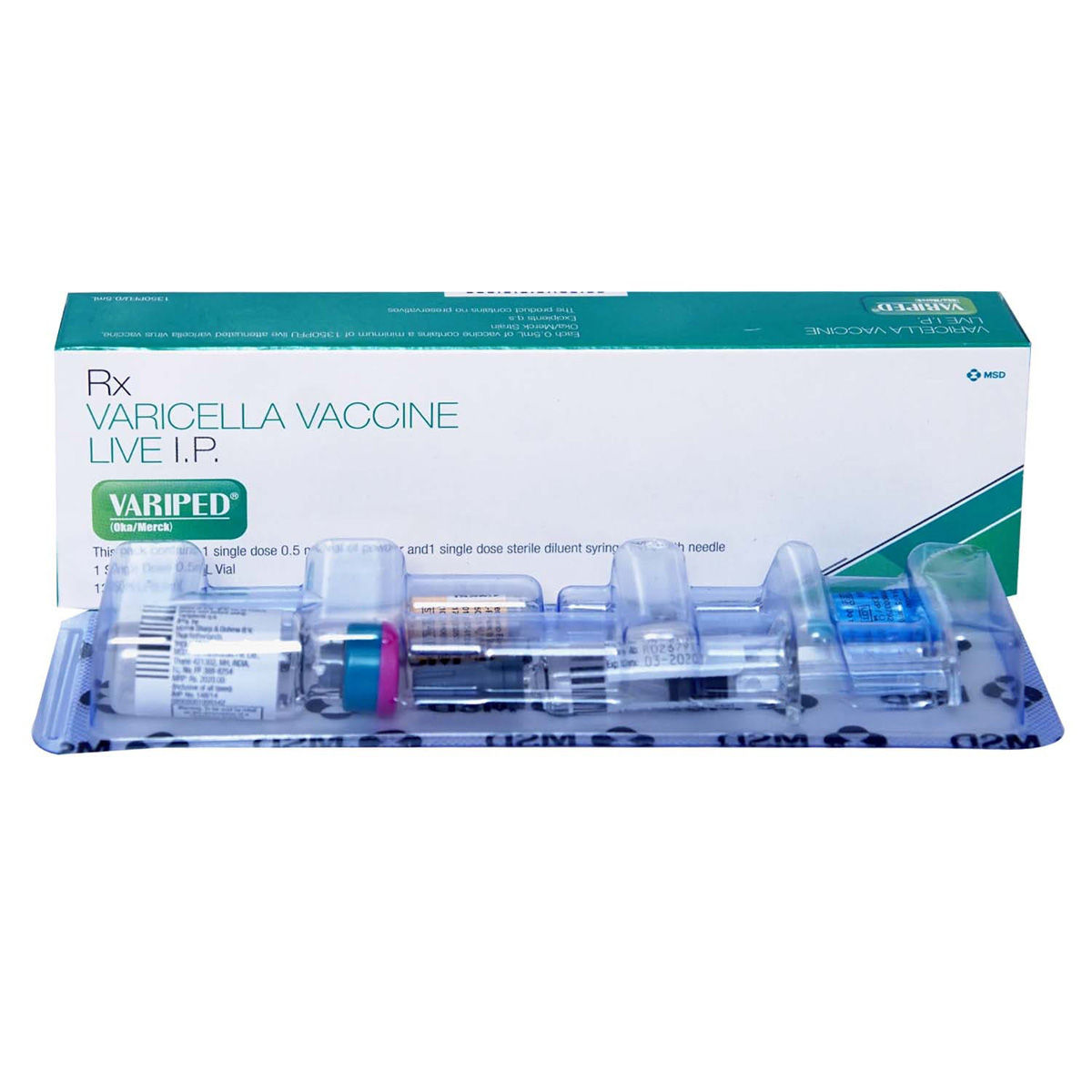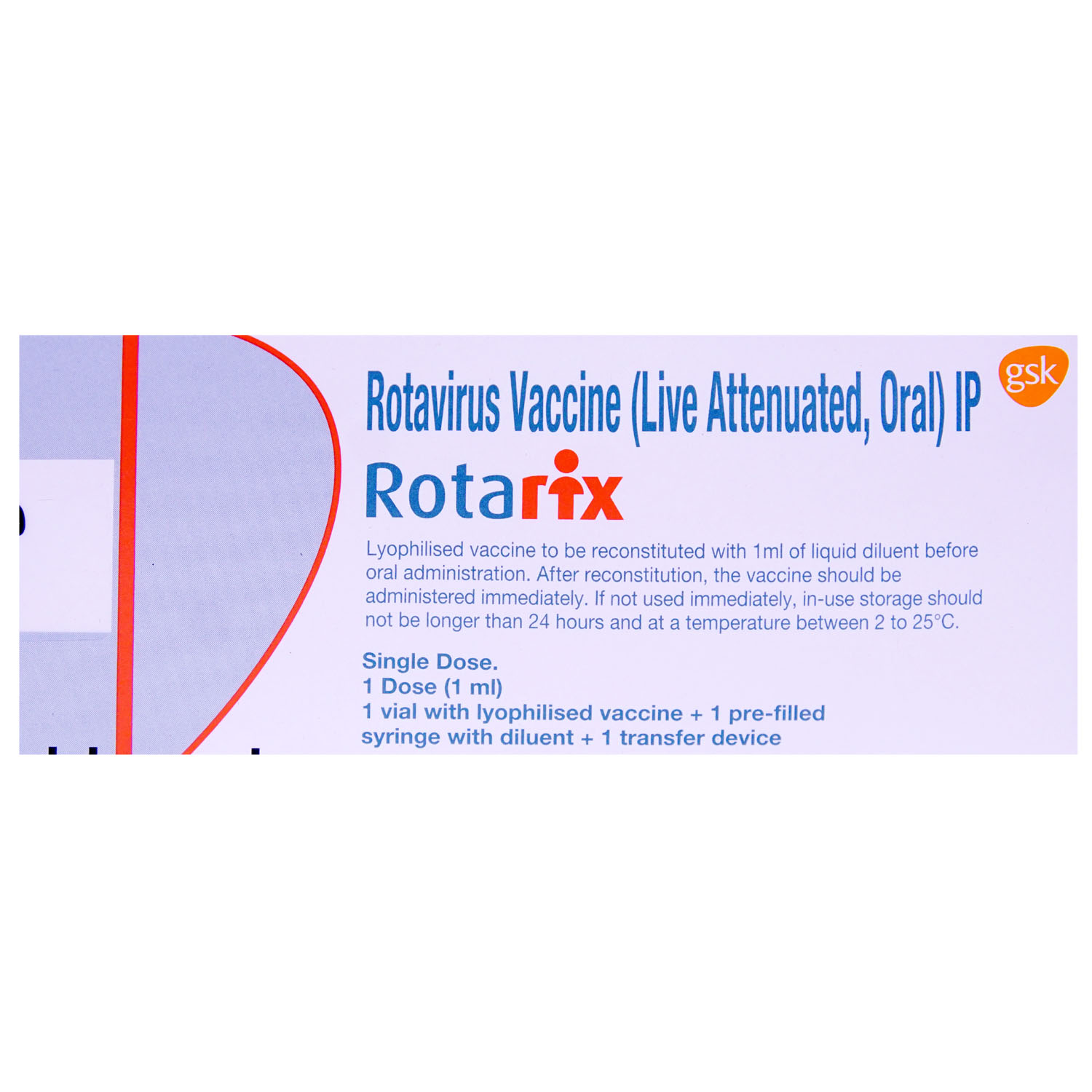Varicella (live Attenuated)
About Varicella (live Attenuated)
Varicella (live Attenuated) belongs to the class of medications called ‘immunizing agents’ used to prevent varicella or chickenpox. Chickenpox is a vaccine-preventable viral infection caused by the varicella-zoster virus. It is highly contagious, especially in people who have never had the disease or have not been vaccinated against it. Symptoms include rash, small painful blisters, fever, sore throat, and body pain.
Varicella (live Attenuated) is an immunizing agent or vaccine made from a live, weakened or attenuated varicella-zoster virus. It helps to provide persistent or long-lasting protection against varicella or chickenpox. Varicella (live Attenuated) helps develop immunity by forming antibodies and stimulating the immune system. It is essential to take the vaccine doses per the doctor’s advice for effective protection against the disease.
Varicella (live Attenuated) will be administered by a healthcare professional; hence, do not self-administer. Varicella (live Attenuated) may cause side effects such as fever, pain, swelling, and redness at the injection site. These side effects are mild and temporary. However, if these side effects persist or worsen, inform your doctor immediately.
It is not recommended to take Varicella (live Attenuated) if you are allergic to neomycin or any contents present in this medicine. Varicella (live Attenuated) should not be given to people with blood disorders or cancer of the blood (leukaemia) or immune system (lymphoma), with a weak immune system, such as patients with HIV or AIDS, who are receiving immunosuppressants or receiving high doses of corticosteroids, who have active untreated tuberculosis, and who have a temperature higher than 38.50c Varicella (live Attenuated) should not be given to pregnant women and used with caution in breastfeeding mothers. Varicella (live Attenuated) is not recommended for children below 9 months of age. Varicella (live Attenuated) should be used with caution in elderly people. Varicella (live Attenuated) may not interact with alcohol and may not affect your driving ability.
Uses of Varicella (live Attenuated)
Medicinal Benefits
Varicella (live Attenuated) provides active immunization against varicella-zoster virus or chickenpox disease for healthy individuals above nine months of age. It benefits people who are non-immune and at risk of infection, such as healthcare workers or workers in children's day-care centres, non-immune parents of young children, and non-immune household contacts of patients with weak immune systems with no history of the disease. Vaccination within three days of exposure to the virus can reduce the risk of infection and the severity of the disease.
Directions for Use
Storage
Side Effects of Varicella (live Attenuated)
- Fever
- Pain or redness at the injection site
- Swelling at the injection site
Drug Warnings
People who have been vaccinated with Varicella (live Attenuated) should avoid close contact for up to 6 weeks with the following individuals: who have not been previously vaccinated against chickenpox, children/adults/pregnant women who have never had chickenpox, who have a weak immune system or receiving immune suppressants, and new-born babies whose mother have never had chickenpox. Adults and children with weak immune systems who receive Varicella (live Attenuated) should be closely monitored as this vaccine is less effective in these people. In people who have undergone blood or plasma transfusion and who have taken human normal immunoglobulin or varicella-zoster immunoglobulin, the Varicella (live Attenuated) vaccine should be avoided or postponed for at least five months. Besides, people should not receive any immunoglobulin medicines for one month following Varicella (live Attenuated). You should not take painkillers (aspirin) for six weeks following Varicella (live Attenuated) as it may cause Reye syndrome (a severe condition that causes liver and brain damage). Women of childbearing potential should use reliable contraceptive methods as it is not recommended to get pregnant for one month following Varicella (live Attenuated) vaccination.
Drug Interactions
Drug-Drug Interactions: Varicella (live Attenuated) should not be given to patients taking immune suppressive therapy (tacrolimus, cyclosporine, and azathioprine, etc.) or high doses of corticosteroids (prednisone, methylprednisolone, and dexamethasone, etc.). Varicella (live Attenuated) may interact with a pain killer (aspirin) and cause Reye syndrome (a severe condition that causes liver and brain damage). Varicella (live Attenuated) may also interact with immunoglobulin therapy (human normal immunoglobulin and varicella-zoster immune globulin).
Drug-Food Interactions: No interactions found.
Drug-Disease Interactions: Varicella (live Attenuated) should not be used in patients with cancer-related to blood (leukaemia) and immune system (lymphoma), HIV or AIDS, active untreated tuberculosis, and fever (higher than 38.5°C).
Drug-Drug Interactions Checker List:
Safety Advice

Alcohol
cautionDo not consume alcohol with Varicella (live Attenuated) as it may result in serious side effects.

Pregnancy
unsafeVaricella (live Attenuated) is not recommended during pregnancy. If you are pregnant, inform your doctor before taking this medicine.

Breast Feeding
cautionVaricella (live Attenuated) is probably safe to use while breastfeeding. According to limited human data, the drug poses no significant risk to the baby.

Driving
safe if prescribedVaricella (live Attenuated) may not affect your ability to drive.

Liver
safe if prescribedVaricella (live Attenuated) does not affect liver function. However, if you have liver problems, your doctor will weigh the benefits and risks before prescribing this medication based on your condition.

Kidney
safe if prescribedVaricella (live Attenuated) does not affect kidney function. However, if you have kidney problems, your doctor will weigh the benefits and risks before prescribing this medication based on your condition.

Children
cautionVaricella (live Attenuated) should not be given to children under nine months of age. In children from 9 months to 12 years of age, Varicella (live Attenuated) should be used with caution as dosage adjustments are necessary.
Habit Forming
Diet & Lifestyle Advise
- Eat bland foods such as rice, pasta, and oatmeal and soft foods such as mashed potatoes, sweet potatoes, boiled eggs, avocado, and boiled chicken.
- Prefer eating yoghurt, milkshakes, and smoothies. Avoid eating spicy, salty, and acidic foods.
- Stay hydrated. Prefer drinks such as coconut water, herbal teas, low-sugar drinks, and electrolyte-infused drinks.
- Do not scratch or itch the rashes, as this may worsen them. Regular hand washing and nail trimming can avoid the spreading of infection.
- Monitor your temperature regularly. Sponging can help to reduce fever.
- Take adequate rest and sleep.
- Stay isolated and do not go outside until the last blister has disappeared.
- Vaccinate all the contacts (family members or caretakers) within 3 to 5 days post-exposure to the virus.
Special Advise
- Varicella (live Attenuated) should not be given intravenously (IV). It is given under the skin or into the muscle. If given into the muscle, the upper arm area is preferred in adults, and the thigh area is preferred in children. The injection is usually given under the skin if you have a blood clotting disorder or thrombocytopenia (low levels of platelets).
- If there is a requirement to give more than one live virus vaccine simultaneously, these injections should be given at different sites. However, if it is not necessary to give them on the same day, they should be spaced at an interval of at least four weeks.
Patients Concern
Disease/Condition Glossary
Chickenpox: The varicella-zoster virus causes a vaccine-preventable viral infection. It is extremely contagious, especially among people who have never had the disease or have not been immunised against it. Although it is most commonly seen in children, adults can contract this infection. Rashes, small painful blisters, fever, sore throat, and body pain are all common symptoms. This disease is treated with antiviral medications. Avoid contact with other people who have chickenpox and practise good hygiene to recover quickly.
FAQs
Varicella (live Attenuated) is used to prevent varicella or chickenpox.
Varicella (live Attenuated) is an immunizing agent or vaccine from a live, weakened, or attenuated varicella-zoster virus. It helps to provide persistent or long-lasting protection against varicella or chickenpox by stimulating the immune system to form antibodies.
Your doctor will determine the number of doses required based on age, vaccine history and health condition. You must inform your doctor if you have taken any vaccines before taking Varicella (live Attenuated).
Taking aspirin, aspirin-containing drugs, or any other salicylates for at least six weeks after taking Varicella (live Attenuated) is not recommended as it may cause Reye's syndrome, a severe condition resulting in liver and brain damage.
Varicella (live Attenuated) may cause side effects such as fever, pain, swelling, and redness at the injection site. These side effects are usually mild and temporary. However, if any of these side effects persist or get worse, inform your doctor immediately.








